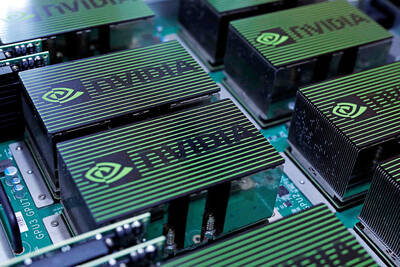The US-Taiwan Business Council urged the government to ensure local chipmakers have adequate access to capital for the purpose of building enough capacity to fend off growing competition from the deep-pocketed United Arab Emirates (UAE) and GlobalFoundries, Inc.
The investment company Advanced Technology Investment Co (ATIC) — wholly owned by the Abu Dhabi emirate — holds a share of about 68 percent in GlobalFoundries, while US chipmaker AMD holds the rest.
“Taiwan and South Korea need to pay attention to the UAE’s plans to become a worldwide chip manufacturing hub. GlobalFoundries is the centerpiece of that plan, but the UAE is also seeking to create major technology clusters around GlobalFoundries facilities,” Council president Rupert Hammond-Chambers said in a press release issued on Thursday.
The US-Taiwan Business Council is a membership-based non-profit association, founded in 1976 to foster trade and business relations between the US and Taiwan.
“With fabrication plants and technology clusters in proximity to Abu Dhabi’s international airport, UAE-manufactured chips could be efficiently shipped to both Asian and European markets,” Hammond-Chambers said.
GlobalFoundries, which entered the contract chip manufacturing industry last year, aims to seize a 30 percent market share by 2012, which would help the new player replace Taiwan’s United Microelectronics Corp (UMC, 聯電) as the world’s No. 2 contract chipmaker.
To hit that goal, GlobalFoundries plans to spend between US$2.7 billion and US$2.8 billion on capacity expansion this year, mostly in the US and in Europe.
This move comes while Taiwan Semiconductor Manufacturing Co (TSMC, 台積電), the world’s top contract chipmaker, plans to boost its capital spending to a record high of US$5.9 billion for this year.
TSMC’s aggressive capacity expansion is aimed at staving off competition from the deep-pocketed GlobalFoundries, by ensuring that TSMC’s capacity would be able to meet global demand and that it could maintain its technological leadership, Hammond-Chambers said.
TSMC chairman Morris Chang (張忠謀) said on July 29 that he would not comment on any competitors when asked by an analyst about the potential threat from GlobalFoundries.
Chang stressed that TSMC was the largest effective capacity supplier by far.
Though TSMC has sufficient cash, the Taiwanese government has to ensure that its entire chip industry has adequate access to capital to meet the challenge of the UAE’s seemingly unlimited willingness to fund GlobalFoundries’ expansion, Hammon-Chambers said.
The largest Taiwanese chipmakers are currently forecast to lay out US$14.1 billion on capital spending this year, higher than current estimates by market researchers and other industry groups, the council said.

Leading Taiwanese bicycle brands Giant Manufacturing Co (巨大機械) and Merida Industry Co (美利達工業) on Sunday said that they have adopted measures to mitigate the impact of the tariff policies of US President Donald Trump’s administration. The US announced at the beginning of this month that it would impose a 20 percent tariff on imported goods made in Taiwan, effective on Thursday last week. The tariff would be added to other pre-existing most-favored-nation duties and industry-specific trade remedy levy, which would bring the overall tariff on Taiwan-made bicycles to between 25.5 percent and 31 percent. However, Giant did not seem too perturbed by the

AI SERVER DEMAND: ‘Overall industry demand continues to outpace supply and we are expanding capacity to meet it,’ the company’s chief executive officer said Hon Hai Precision Industry Co (鴻海精密) yesterday reported that net profit last quarter rose 27 percent from the same quarter last year on the back of demand for cloud services and high-performance computing products. Net profit surged to NT$44.36 billion (US$1.48 billion) from NT$35.04 billion a year earlier. On a quarterly basis, net profit grew 5 percent from NT$42.1 billion. Earnings per share expanded to NT$3.19 from NT$2.53 a year earlier and NT$3.03 in the first quarter. However, a sharp appreciation of the New Taiwan dollar since early May has weighed on the company’s performance, Hon Hai chief financial officer David Huang (黃德才)

NVIDIA FACTOR: Shipments of AI servers powered by GB300 chips would undergo pilot runs this quarter, with small shipments possibly starting next quarter, it said Quanta Computer Inc (廣達), which supplies artificial intelligence (AI) servers powered by Nvidia Corp chips, yesterday said that AI servers are on track to account for 70 percent of its total server revenue this year, thanks to improved yield rates and a better learning curve for Nvidia’s GB300 chip-based servers. AI servers accounted for more than 60 percent of its total server revenue in the first half of this year, Quanta chief financial officer Elton Yang (楊俊烈) told an online conference. The company’s latest production learning curve of the AI servers powered by Nvidia’s GB200 chips has improved after overcoming key component

UNPRECEDENTED DEAL: The arrangement which also includes AMD risks invalidating the national security rationale for US export controls, an expert said Nvidia Corp and Advanced Micro Devices Inc (AMD) have agreed to pay 15 percent of their revenue from Chinese artificial intelligence (AI) chip sales to the US government in a deal to secure export licenses, an unusual arrangement that might unnerve both US companies and Beijing. Nvidia plans to share 15 percent of the revenue from sales of its H20 AI accelerator in China, a person familiar with the matter said. AMD is to deliver the same share from MI308 revenue, the person added, asking for anonymity to discuss internal deliberations. The arrangement reflects US President Donald Trump’s consistent effort to engineer